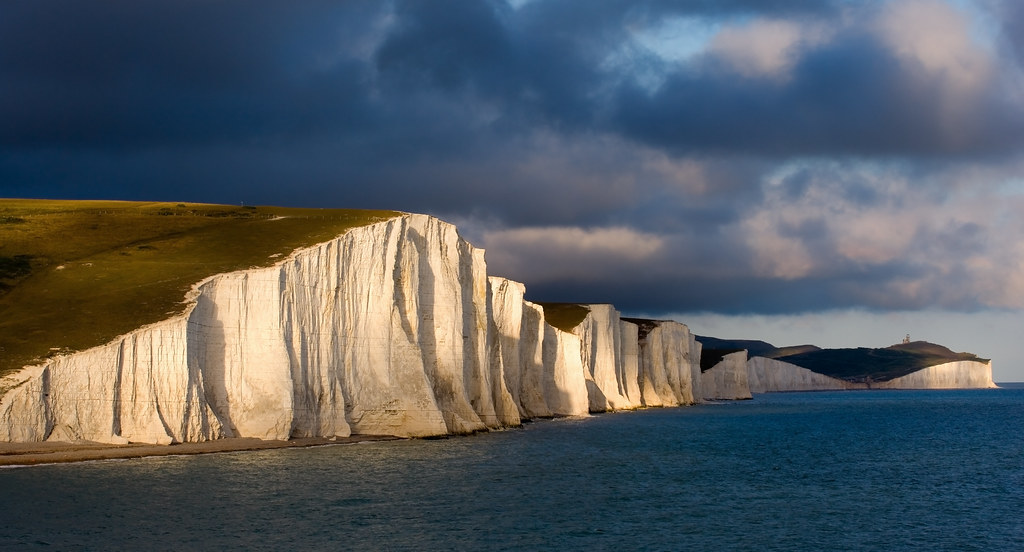Interview with Total Photoshop Magazine
Max Furia, editor of the splendid Italian website, Total Photoshop recently interviewed me about my approach to landscape photography. If your Italian is up to scratch, please go ahead and read the interview. I think we can forgive the editor for not having heard of curry. Half of Italy now thinks I go for a beer and a bowl of soup, when I finish for the day. For those of us, including myself, who failed at languages during school, I've included the full interview in English.

------
Landscape Photography Explained by Alan Mackenzie
He is a young British photographer. I have always been impressed by the quality and compositional choices from the very first time I saw them. Alan makes it clear that it's tough and he is not afraid of hard work. I couldn't help but ask him for some advice and for some interesting stories about his experience of landscape photography. Here is what came of our chat.
Welcome to Total-Photoshop, Alan. As usual we like to ask about the lives of photographers. How old are you, where you do live and when did you start taking photographs?
Thank you, it's great to be here on Total-Photoshop. I am 32 years old and I live in a city called Brighton and Hove, on the south coast of England. I am very lucky to have the coast and countryside within easy reach. I began photography aged 16 at the City Camera Exchange, in Croydon. My father gave me the choice between a camera and telescope. I chose the camera, because I saw a chance to combine my already established interest in the natural world with creativity. Within one month, I'd taken a picture, which was published in Amateur Photographer magazine. Our family garden, in a leafy part of Brighton, was visited regularly by foxes and badgers. It wasn't difficult to go out into the garden and re-enact what I'd just seen on a TV nature documentary. As a family, we functioned well outdoors, hence I have many happy memories of days out in the Sussex countryside along with holidays in places, such as the New Forest, the Malvern Hills and the Cotswolds. Give the child nature for his first eleven years and I'll give you the man.
Thank you, it's great to be here on Total-Photoshop. I am 32 years old and I live in a city called Brighton and Hove, on the south coast of England. I am very lucky to have the coast and countryside within easy reach. I began photography aged 16 at the City Camera Exchange, in Croydon. My father gave me the choice between a camera and telescope. I chose the camera, because I saw a chance to combine my already established interest in the natural world with creativity. Within one month, I'd taken a picture, which was published in Amateur Photographer magazine. Our family garden, in a leafy part of Brighton, was visited regularly by foxes and badgers. It wasn't difficult to go out into the garden and re-enact what I'd just seen on a TV nature documentary. As a family, we functioned well outdoors, hence I have many happy memories of days out in the Sussex countryside along with holidays in places, such as the New Forest, the Malvern Hills and the Cotswolds. Give the child nature for his first eleven years and I'll give you the man.
What equipment do you use?
I use a Canon EOS-1Ds Mark II body and L series lenses ranging from 17mm to 400mm. If I could afford it, I would switch to Nikon, because of the mind blowing low light performance of the Nikon D3s. However, it'll be cheaper to wait until the Canon EOS-1DX hits the shelves, because I've already bought into the excellent Canon EF lens system.
Your subjects are landscapes. Describe an important concept about landscape photography. What we absolutely have to know and remember?
The most important stage in the process of landscape photography is the first: a correctly lit and exposed RAW file looks almost 'ready' for publication, even before the post-processing stage. The standard of my landscape photographs has vastly improved since I began using LEE neutral density graduated filters to address exposure and lighting issues. When a photo is correctly exposed across the frame, very little post-processing in Adobe Photoshop is required. Only curves, tones, contrast and saturation adjustments are necessary. I seldom create images from multiple exposures and never use HDR. These techniques are rarely done well and often produce unrealistic results.
As my photographs show, it is possible, even desirable, to get everything right at the time of exposure and consequently treat Photoshop as a means to an end. No amount of hocus-pocus will rescue a poorly lit or incorrectly exposed photo. I feel quite strongly about this. I anticipate many people will become quite defensive. Images that have been overdone during the post-processing stage show disdain for natural beauty. It's neither desirable or necessary to make the natural world 'better' than it really is, which is why I only take landscape photographs when the lighting, weather and visibility is optimal. Early morning or late evening are the best times. If conditions are unsuitable, I simply don't go out taking photographs.
Tell us a story behind your shoots.
England suffered the coldest December weather in living memory back in 2010. I decided that I wanted an outstanding photograph of a local war memorial in the snow, with a twist of course. I would take the photo at night. The Chattri monument is located at the top of a series of hills called the South Downs. I waded through 50cm snow drifts for over a mile and underneath my layers of clothes, it felt like a boiling hot summer's day. I arrived at the Chattri and removed my outer gloves, to set up the camera and tripod. When I picked up the gloves a few minutes later, to my surprise, the sweat inside them had frozen solid. Handling my tripod reminded me of what happens when one touches the interior of a freezer cabinet. My fingers stuck to the metal bars. The digital thermometer I had brought with me gave a reading of -13°C. Rather than time the long exposures, I listened to music on my phone and deactivated the remote cable at the end of each song. I finally gave up after 90 minutes, because I was entering the early stages of hypothermia. On the way back, I waded through 50 cm snow drifts, which my body heat partially melted. I first noticed that I was wearing a pair of frozen trousers when I reached Brighton. I often conclude my expeditions with a beer and curry. I think I'd truly earned them on this occasion!
What tips do you have for new photographers approaching landscape photography?
Firstly, the price of being in the right place at the right time is being in the wrong place at the wrong time, hundreds of times. Learn to accept disappointing outcomes in the field as learning moments. The natural world isn't here for our benefit. It just goes on existing and has no regard for whether or not a photographer has a portfolio to build. Secondly, if you want to create evocative, beautiful and original landscape photographs, you must work very hard. Many young people in England and I suspect elsewhere, have an 'X-Factor mindset'. The idea that anybody can be talented and become famous is a canard. When people tell me that I must be very gifted, my response is that my achievements aren't gifts from above. They are the result of a complex series of life experiences and of course, an ongoing commitment to achieve the highest possible standards, while hopefully managing not to take oneself too seriously. Thirdly, the marriage of technical excellence and true love of natural beauty will reward you and everyone else.

Thank you for your sharing. We hope to meet you again soon.
Thank you, it's been a joy.
Comments